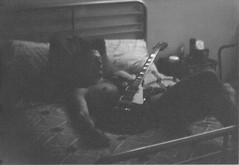California here we come
I'm so happy I can hardly count. This afternoon I fly out to Los Angeles for a job interview with St. Jude Medical. The position is in the Cardiac Rhythym Management Division, doing leads development. In a nutshell, I'll be meeting with the entire Leads team over the course of the day tomorrow to see if I'm a fit. One of the senior recruiters has told me a number of times that people who can do leads design well will never have to worry about having a job.
Don't know what leads are?For those in the dark about what this position entails, the "lead" is essentially a very specialized wire that delivers electricity from, say, a pacemaker to the heart. Leads are super-important for a number of reasons.
- Implantable medical devices like pacemakers and defibrillators run on really tiny batteries. Think like your watch battery. But now consider that you're powering something stronger than a watch, and you need to make sure the battery will last 10-20 years, and you want 0% chance that the battery will die prematurely because someone's life is counting on it. So you need to deliver the current as efficiently as possible, and a good lead can allow that.
- These wires are inside someone's body. A cardiac surgeon puts them in. They shouldn't have to come out. You need to make sure that the wires are well-insulated, both electrically and biologically, from the rest of the body. Not to mention you need to design a wire that won't kink and won't dislodge once placed.
- What happens when everyone finally takes the age-old advice of diet and exercise, and cardiovascular disease declines to near-null numbers? Will the pacing/defibrillation industry go bust? Well, leads are used in all sorts of other medical device applications that are on the up-and-coming, for example neural stimulators to treat tremor and other symptoms of Parkinson's. There are also some studies using implantable stimulators to treat severe anxiety and other psychological disorders. In fact, a good leads designer can make a wire targeted for pretty much any structure in the human body, and I'm sure that a host of novel applications of electrical stimulation are under investigation.
So, I can't wait to get out there (yes, it'll be my first time ever on the West Coast) and show 'em who I am, what I know, and how I think.



 Gears and Coffee
Gears and Coffee
0 Comments:
What do you think?
<< Home